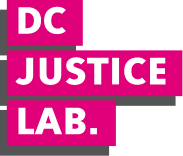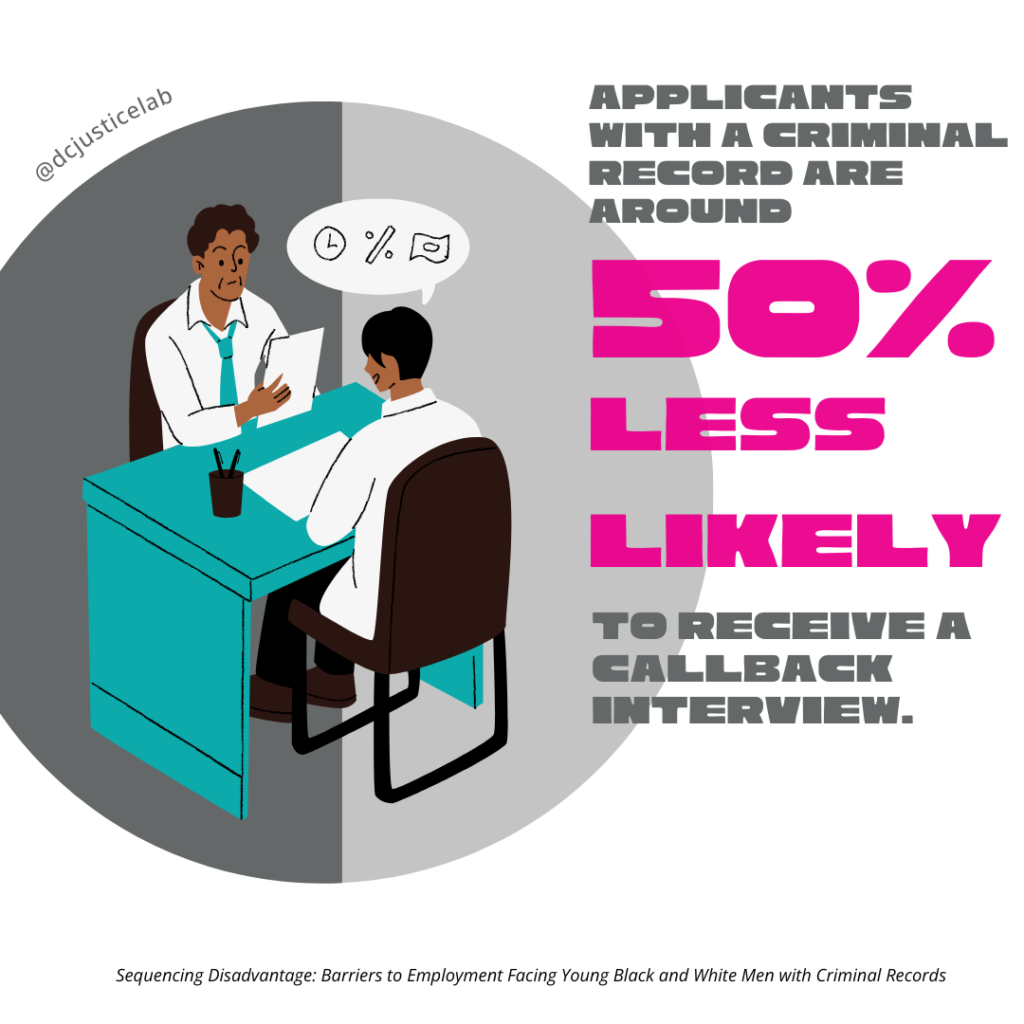
Criminal record discrimination
People with criminal records lack core protections from the systemic discrimination they face.
- 3 Minute Read
Individuals with prior criminal records often encounter discrimination in areas like employment, education, and housing. In DC, this discrimination disproportionately affects Black individuals, with 96 percent of those sentenced felony crimes being Black. While DC has tried to limit when a record can be asked about in a hiring process and is moving towards automated processes to remove a criminal record, other places, like Illinois, Wisconsin, and Atlanta have gone further to add people with records as protected classes in human rights statutes. DC should amend the DC Human Rights Act to add incarceration, conviction or arrest history as protected classes so that the Office of Human Rights can investigate cases of discrimination on these grounds.

What you need to know
People with criminal records are not a protected class in DC
A “protected class” refers to groups of people who are named in statute as being harmed by laws, practices, and policies that discriminate against them due to a shared trait. In DC, someone who is part of a protected class can file a lawsuit under the DC Human Rights Act if they have been discriminated against, and can seek compensation for what occurred. The Office of Human Rights also has procedures and processes to investigate claims of discrimination for a protected class. In DC, there are now 23 protected traits, up from 19 just a few years ago. With more traits named for protection than other states or jurisdictions, the fact that DC does not name criminal records as a protected class is a conspicuous absence.
The discrimination people with criminal records face reduces safety for everyone.
Studies on the treatment of people with criminal records in DC and around the country have shown that they experience discrimination by employers, landlords, and civic institutions. Someone with a criminal record is 50 percent less likely to receive a call back or job offer than someone with no criminal record. Even in a strong economy, the unemployment rate for a formerly incarcerated person was five times that of the national rate. The White House recently said, “there is substantial evidence of labor force discrimination against formerly incarcerated individuals, both due to concerns about recidivism and gaps in work experience, and a general stigma above and beyond productivity-related factors.” Because employment and housing are core protective factors that have been repeatedly shown to be associated with reduced recidivism, not having access to a job or a place to live reduces our overall safety.
Discrimination will continue even with “ban the box” and sealing and expungement.
DC’s efforts to Ban the Box – to limit when someone could be asked about their record or incarceration status – was only used to address employment discrimination in a couple of hundred cases. That’s one reason why lawmakers passed the Second Chance Act – legislation that expands opportunities for expungement and record sealing in DC. Because the Mayor chose not to fund it, DC’s new expungement and sealing law will not be implemented until 2026, and even then, is still limited in the types of charges eligible to be removed and require some people to wait a long time until they are eligible. Neither Ban the Box nor the Second Chance Act empowers an independent DC agency to investigate when discrimination against people with criminal records occurs.
Other places have recognized people with criminal records as a protected class.
Wisconsin prohibits employers and licensing agencies from discriminating against someone based on arrest or conviction status. In 2021, Illinois lawmakers amended their human rights statute so any person experiencing discrimination at work or with a potential job because of their conviction record can now file a charge of discrimination with the Illinois Department of Human Rights. Atlanta, Georgia’s city council passed an ordinance in October 2022 adding criminal record status to the list of factors that have “protected class” status in the city. JustLeadership USA, a national network of people with criminal records have called for amending the equal protection clauses of the 1964 federal Civil Rights Act to include people with convictions. The Department of Housing and Urban Development has offered guidance that argues, people with criminal records should be covered under the Fair Housing Act’s prohibition of discrimination against protected classes.
WHERE TO LEARN MORE
The White House April 2023
Barred Business April 2023
Illinois Department of Human Rights March 2021
U.S. Department of Housing and Urban Development April 2016
JustLeadership USA April 2016
U.S. Commission on Civil Rights June 2018
Our Solutions
DC Should:
- Amend the Human Rights Act to include criminal record status as a protected class
- Increase resources to the Office of Human Rights so that it can investigate all claims of discrimination
special thanks
Courtney Stewart



